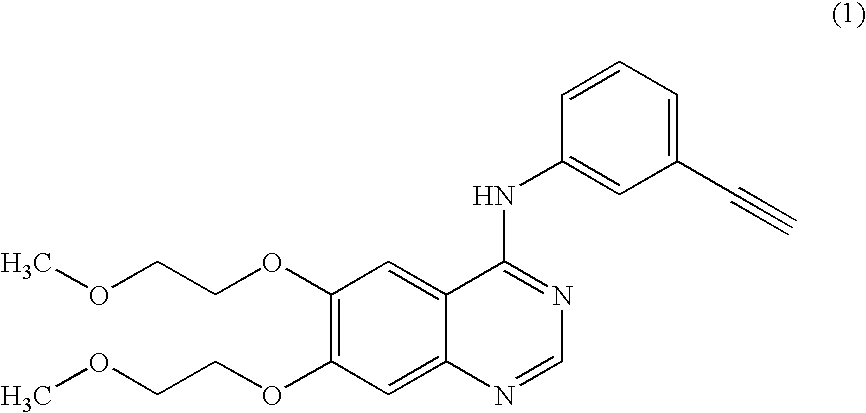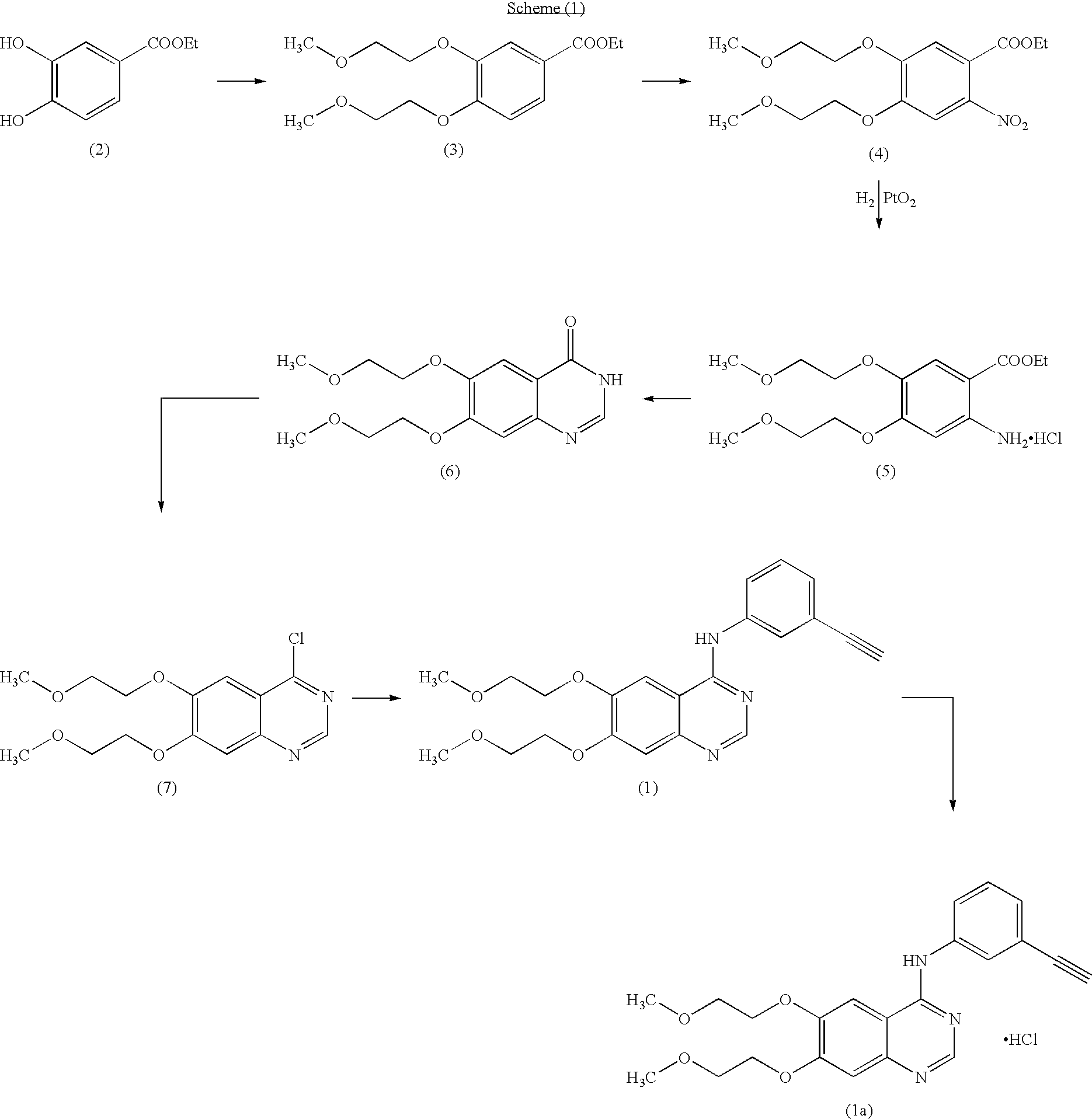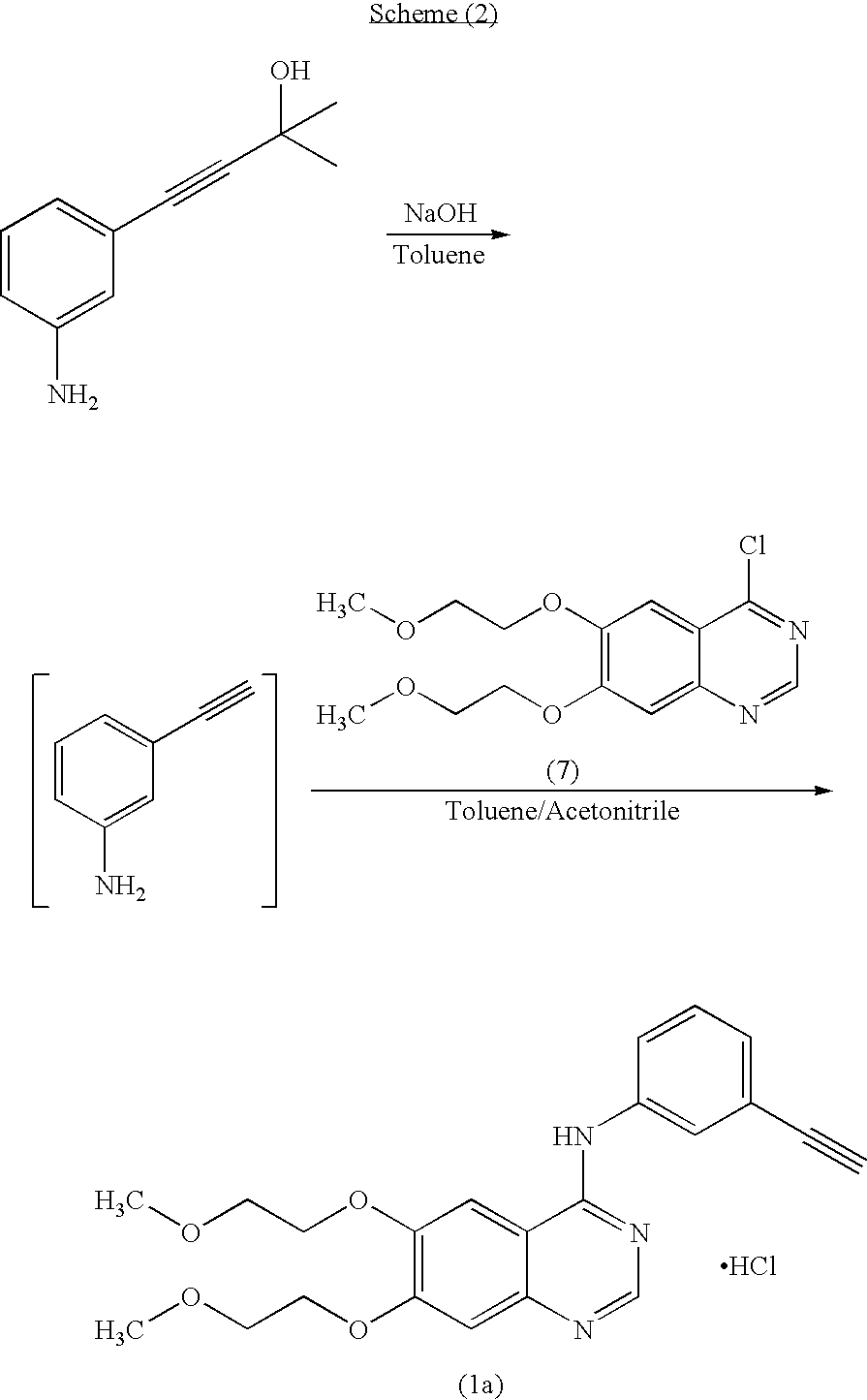Novel process for the prepartion of erlotinib
a technology of erlotinib and erlotinib, which is applied in the field of new erlotinib preparation process, can solve the problems of scale dependent reaction and inability to economically implement the above-mentioned process, and achieve the effect of convenient and cheap raw materials, simple and economical and commercially applicabl
- Summary
- Abstract
- Description
- Claims
- Application Information
AI Technical Summary
Benefits of technology
Problems solved by technology
Method used
Image
Examples
example-1
Preparation of N-(3-ethynylphenyl)-6,7-bis(2-methoxyethoxy)-4-quinazolinamine (Erlotinib Base)
(i) Preparation of 6,7-dihydroxy-4 (3H)-quinazolinone of formula (9)
[0039]Into a 2.0 Lt four necked round bottomed flask equipped with a mechanical stirrer, reflux condenser and thermometer socket are charged 48% (w / w) hydrobromic acid (1000 g) and 6,7-dimethoxy-4 (3H)-quinazolinone (100 g). Slowly heated the reaction mass to reach 110° C. and maintained for 1 hour at the same temperature. Then raised mass temperature to reach reflux condition and refluxed for 12 hours. Monitored the completion of the reaction by TLC. Then cooled the reaction mass to 25-35° C. and filtered the mass. Transferred the wet cake into another 2.0 Lt round bottomed flask containing 1000 ml of DM water. Stirred for 10-15 minutes and adjusted the pH to 7.0-7.5, by adding aqueous ammonia solution. Filtered the resulting product and washed the cake with DM water and dried to get 85.2 g (98.62% by theory) of 6,7-dihydr...
example 2
Preparation of N-(3-ethynylphenyl)-6,7-bis(2-methoxyethoxy)-4-quinazolinamine hydrochloride (Erlotinib hydrochloride) of formula (1a)
[0083]Into a 1.0 L four necked round bottomed flask equipped with a mechanical stirrer, reflux condenser and thermometer socket, are charged Isopropyl alcohol (600 ml), Erlotinib base (30 g) obtained by the process described in step (vii) of example (1) and slowly raised the temperature to 75-80° C. to dissolve completely. Then activated carbon (6 g) was charged and maintained for 15-20 minutes. Filtered and washed the carbon cake with hot isopropyl alcohol. The combined filtrate and washings were cooled to 40-45° C. then isopropyl alcohol-HCl (1.1 molar equivalent) was slowly added in about 10-15 minutes. Raised the temperature to 60-65° C. and maintained for 1 hour. Cooled to 25-30° C. and filtered the product and washed the cake with Isopropyl alcohol and dried to get 30.5 g (93.2% by theory) of Erlotinib monohydrochloride as a white solid.
[0084]Pur...
example 3
Preparation of N-(3-ethynylphenyl)-6,7-diacetoxy-4-quinazolinamine hydrochloride of formula (12) (X═Cl)
[0085]Into a 3.0 L four necked round bottomed flask, equipped with a mechanical stirrer, reflux condenser, pressure equalizing addition funnel and thermometer socket are charged chloroform (500 ml), 6,7-diacetoxy-4 (3H)-quinazolinone (25 g) obtained from the process described in step (ii) of example (1) and dimethylformamide (3 ml). Thionyl chloride (46.2 g) was slowly added in about 20-30 minutes. The reaction mass was slowly heated to reflux temperature and maintained at reflux temperature for 6 hours. Reaction was found to be over by HPLC. Cooled the reaction mass to 25-30° C. and slowly quenched into saturated sodium bicarbonate solution at less than 10° C. Separated the organic layer and dried over anhydrous sodium sulfate. The dried organic layer containing 4-chloro-6,7-diacetoxyquinozoline (11) (X═Cl) thus obtained was directly used in the next step without purification.
[008...
PUM
 Login to View More
Login to View More Abstract
Description
Claims
Application Information
 Login to View More
Login to View More - R&D
- Intellectual Property
- Life Sciences
- Materials
- Tech Scout
- Unparalleled Data Quality
- Higher Quality Content
- 60% Fewer Hallucinations
Browse by: Latest US Patents, China's latest patents, Technical Efficacy Thesaurus, Application Domain, Technology Topic, Popular Technical Reports.
© 2025 PatSnap. All rights reserved.Legal|Privacy policy|Modern Slavery Act Transparency Statement|Sitemap|About US| Contact US: help@patsnap.com



